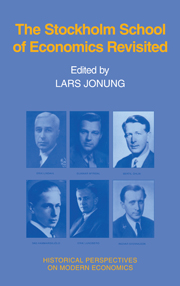Book contents
- Frontmatter
- Dedication
- Contents
- Preface
- List of Contributors
- Dramatis Personae at the end of 1937
- Introduction and Summary
- Part I The roots
- Part II The approach of the Stockholm School
- 4 Expectation and plan: The microeconomics of the Stockholm School
- 5 Sequence analysis and optimization
- 6 There were two Stockholm Schools
- 7 On formal dynamics: From Lundberg to chaos analysis
- 8 Lundberg, Keynes, and the riddles of a general theory
- 9 Macrodynamics and the Stockholm School
- Comment
- 10 Ohlin and the General Theory
- 11 The monetary economics of the Stockholm School
- 12 The Austrians and the Stockholm School: Two failures in the development of modern macroeconomics?
- 13 The political arithmetics of the Stockholm School
- 14 After the Stockholm School
- Part III The impact of the Stockholm School
- Part IV What remains of the Stockholm School?
- The Stockholm School: A non-Swedish bibliography
Comment
Published online by Cambridge University Press: 05 July 2013
- Frontmatter
- Dedication
- Contents
- Preface
- List of Contributors
- Dramatis Personae at the end of 1937
- Introduction and Summary
- Part I The roots
- Part II The approach of the Stockholm School
- 4 Expectation and plan: The microeconomics of the Stockholm School
- 5 Sequence analysis and optimization
- 6 There were two Stockholm Schools
- 7 On formal dynamics: From Lundberg to chaos analysis
- 8 Lundberg, Keynes, and the riddles of a general theory
- 9 Macrodynamics and the Stockholm School
- Comment
- 10 Ohlin and the General Theory
- 11 The monetary economics of the Stockholm School
- 12 The Austrians and the Stockholm School: Two failures in the development of modern macroeconomics?
- 13 The political arithmetics of the Stockholm School
- 14 After the Stockholm School
- Part III The impact of the Stockholm School
- Part IV What remains of the Stockholm School?
- The Stockholm School: A non-Swedish bibliography
Summary
Professor Brems gives a very articulate analysis of the Stockholm School and Keynes from the point of view “of the new reality of the steady-state equilibrium growth of the 1950s and 1960s” and he finds them, not unexpectedly, to be “obsolescent.” The only lasting contribution of the Stockholm School, from this perspective, is their “early insistence on the use of lags.” However, that was certainly not very original since Dennis Robertson excelled everybody in this respect with all types of lags in Banking Policy and the Price Level of 1926, which had a seminal influence on Keynes in his Treatise on Money of 1930.
From the perspective of the 1970s and 1980s, steady-state equilibrium growth has become obsolescent. Interest has focused on the role of information, for or against rational expectations, and disequilibrium dynamics. In this development, there has been a new interest in temporary equilibrium and sequential economics, both of which were central contributions of the Stockholm School.
- Type
- Chapter
- Information
- The Stockholm School of Economics Revisited , pp. 242 - 244Publisher: Cambridge University PressPrint publication year: 1991



